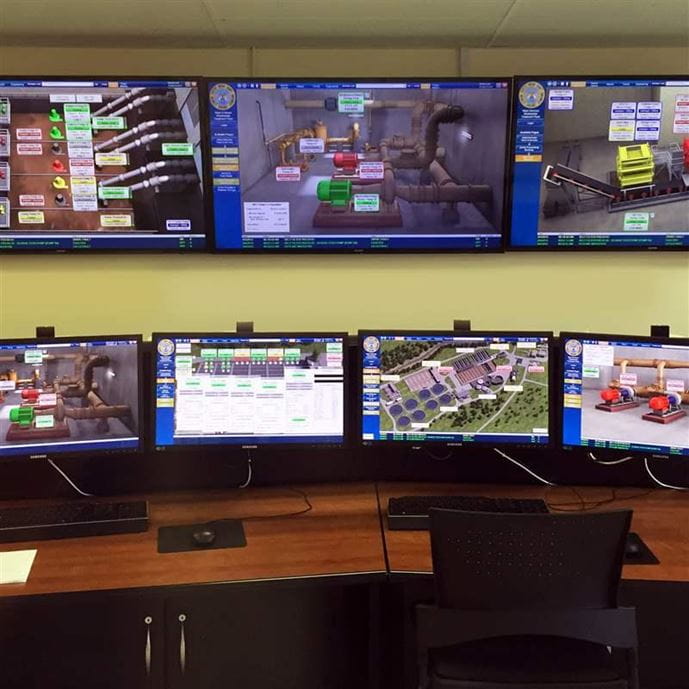The SCADA Gold Standard at a Coastal Connecticut Utility
The Town of Greenwich Department of Public Works (the “Town”) has been working closely with CDM Smith’s automation experts since 2014 to keep Grass Island WWTP’s SCADA system operating ahead of the curve. Matt Lick CDM Smith's discipline leader for operational technology & cybersecurity, drove the system’s upgrades forward to modernize operations with enhanced cybersecurity measures.
The initial upgrade started with a Master Plan in 2014 to evaluate the legacy Distributed Control System (DCS) as components were becoming obsolete and difficult to obtain. The Master Plan led to a design for a new state-of the-art SCADA system and installation was completed in 2018. The initial upgrade to the system was completed in 2018 after the automation team transitioned the WWTP from the legacy DCS to the new SCADA system. Though the legacy system had aged, the transition was relatively seamless, which Matt attributes to how robust the new SCADA system was, along with a detailed maintenance of plant operations (MOPO) plan that was developed in collaboration with Town staff during design, and they refined and executed diligently by the team during construction. Additional documentation was provided to support the new SCADA system to assist the Town with future maintenance, system expansions and troubleshooting which included a SCADA standards handbook and the development of plantwide Process and Instrumentation Diagrams (P&IDs).
Overall, the upgrade encompassed a few different elements that have set a new standard in automation for the town’s wastewater infrastructure.
A well-supported system with flexibility
“The flexibility this new system provides is significant,” Lick said. Before, the plant was operating on a proprietary system that came with limited support from the original vendor, at a high cost. The modern system is vendor-agnostic, which allows the town to seek technical support from different service providers if needed. “This is a cost-saving feature. They don’t have to be locked in to a high-cost contract—that they might not even use—with potentially slow response,” he added. “Our team wanted to make sure the Town always had an open architecture solution that was not tied to any one vendor to keep things operating smoothly.”
The Town has consistently renewed a yearly support contract with the team for ongoing technical help with swift response times. The consistent line of communication between the town and CDM Smith has allowed them to keep the system up to date with regular upgrades or special targeted tasks.
Bolstering cybersecurity measures
One of the most critical pieces of ongoing support was strengthening cybersecurity measures. Matt’s team assisted with implementing security controls needed for the Town to secure proper cybersecurity insurance and even installed a new cybersecurity appliance to further protect the network. “The wastewater industry, like other sectors of critical infrastructure, is unfortunately a prime target for cyberattacks. If one part of the plant’s operations became compromised, it could severely impact its ability to function properly and support the Town’s needs,” Lick explained.
Cybersecurity measures included multi-factor authentication to ensure only authorized personnel could access the system, similar to the security protocols used in online banking where users receive a text with a code for login. Another significant addition to the system was a device designed to continuously monitor the network, which detects any anomalies in traffic and flags the team if unauthorized devices try to connect. “It’s a static system so if we get a new device trying to connect, it’s a major concern,” Lick said. To bolster security even more, the team implemented a demilitarized zone (DMZ) between the plant’s control network and the Internet. Even trusted services like antivirus updates and multi-factor authentication are handled through a secure intermediary server to prevent critical systems from being accessed from outside networks.
A SCADA system that’s built to last
The Town has also embarked on other WWTP upgrades, like improvements to primary tanks, all designed to integrate seamlessly with the SCADA system. “Our goal is that any future upgrades can tie in seamlessly to the updated system. We want to deliver flexible systems for our clients that allow them to expand or improve their processes without having to change out all the equipment,” Lick explained.
Here are his two major takeaways after contributing to this best-in-class project for the automation discipline:
- Invest in the right equipment early: “If your sole decision is based on cost, you might end up making compromises that will cost you significantly more down the road."
- Prioritize cybersecurity from the start: “We couldn’t have made these significant improvements without a strong foundation. We credit the Town with having a solid framework that we could build on.”

We aim to deliver flexible systems that let clients expand or improve processes without replacing all their equipment.







